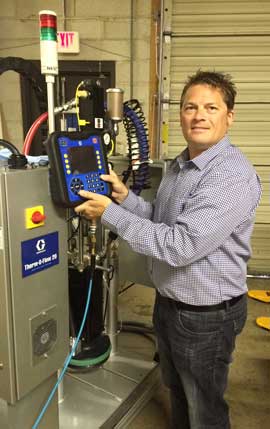There probably hasn’t been a better recitation of the attributes an individual must possess in order to become a successful independent manufacturers’ representative than was recently put forth by Scott White.
When asked whether he’d recommend his profession to others, White, who heads Production Components, Inc., Wallingford, Connecticut, was immediately positive. “Without a doubt, if the individual is cut out to be a rep, that’s exactly what they should do. Having said that, however, I’d maintain that the individual must be a self-motivated people person, who has a high level of positivity in their approach to everything they do. In addition, they’ve got to possess the resolve needed to get themselves through the slow months and years that reps inevitably encounter. At the end of the day, they must have the motivation needed to get up out of bed every morning full of the attitude that if yesterday was awful, today and next week are going to be much better. I’ll get by and survive no matter what happens.”
It’s that attitude and accompanying philosophy that has seen White through his career that began in his father’s agency in the early ‘90s. Production Components, which has been in business in New England since 1977, represents some of the premier manufacturers in the field of assembly, automation and production. The agency has representatives located in Central and Western Connecticut, Rhode Island and New Hampshire.
Attracted to Family Business
Production Components was already 14 years old when White joined the agency in 1991. “I’ll admit that all through college I said to myself that I didn’t want to get into the family business. I wasn’t a technical guy, but ultimately as I looked around at job prospects, the business looked pretty good.”
Armed with a degree in business management with a specialty in marketing from Western Connecticut State University, he continues, “I always knew that whatever I decided to do for a career would involve selling myself. I didn’t want a job with an office in a large firm. I thought I had a certain level of creativity that would allow me to do something on my own.” His father’s independent manufacturers’ rep firm provided the perfect environment for him to nurture those goals.
About eight years after joining his father he began taking over various management functions and completed a buyout in 2004. “While we didn’t really have a formally drafted succession plan, our goal was for me to take over the business in a few years. Basically, as time went by, I just gradually took over things like bookkeeping, sales and territory management, and marketing. As I took over more management responsibilities, we started talking more about the need for succession. Altogether, the succession took about four or five years.”
Absence of Surprises

Scott White, Production Components, Inc., shows how to operate a machine’s functions and settings through the state HMI. “We offer training for all the machines we sell. We feel that solid upfront training reduces the amount of technical help calls we receive.”
Since he had a strong foothold in the agency, White explains that as he got deeper into the business there really weren’t many surprises that faced him. “I will admit, however, that something did occur to wake me up a bit. I found that for a couple of months I actually needed to go into my personal account in order to pay bills. That’s not an overly comfortable position to be in.” Among some other challenges he faced initially were to get up to speed will all the governmental taxes, permits and business licenses, not to mention the needed insurance.
As the company is presently situated it represents 12 principals and employs six individuals (including White) and one independent sub-rep. In speaking about the number of lines that the agency represents, White explains that since the agency recently rejoined MANA, “We’ve experienced a tripling in the number of phone calls we receive from prospective principals. Prior to that increase in the number of phone calls, we’ve been lucky with a great deal of word-of-mouth that spreads the reputation of our agency.” In general, he adds that Production Components isn’t actively pursuing additional lines basically because “We want to avoid a situation where aren’t in complete control of all our lines and ensuring that all of our customers are being properly serviced.”
In the past, the subject of taking on lines where no business exists in the territory has come up for consideration. “We try not to take on virgin lines. We find it’s difficult to take on lines where we have to learn the market. We don’t really have enough time to give that kind of a line a shot. It’s too difficult to generate business for them. That’s why we’ve historically concentrated on lines that involve people that we already know.” He adds that there was one exception to that rule when “There was one line back in 1993 that a company was introducing in the United States. It had been lightly distributed as a catalog item. We did take that one on as a missionary line because it fit so well for us. It has since grown into one of our major lines.”
Changes in Business
With close to a quarter of century already under his belt as an independent manufacturers’ representative, White notes that in that relatively short period of time, he has seen a number of changes in how business is conducted — especially in comparison to how things were done in his father’s time.
Customer Relationships — “Perhaps the major change I’ve seen has been in the definition of the customer relationship. In my father’s day, which really isn’t all that long ago, there were a lot of business lunches and conducting business during a golf match. At the same time, your business was conducted directly with people with whom you enjoyed a personal relationship. Today I’d probably find it a little awkward if I was to say to a customer ‘Let’s grab lunch’ and have him respond ‘Not today, I’ve got a lot going on.’ I don’t know if it’s just me and my style, but I define a quality business relationship as one where I’m able to make my customer’s life easier. Have I been able to do something that allows them to get home early and have a little less stress in their day-to-day activities?
“What I’ve discovered is that I’ve got a good customer relationship when I was hands-on all through the purchase process and the customer received a piece of equipment and the required service that he needed at the right time and the right place.”
“What evolved from that,” he explains, “is that the customer winds up putting me on his speed dial. I’m the one he calls when he has a need. This approach has helped me to develop a prestigious customer base. I’d have to say that we enjoy a higher caliber customer than others. Our customers are the best of the best in New England and that has served our agency well.”
Certainly a part of the customer relationship is the customer’s availability to the agent, and that’s something that also has changed over the years. White explains that “When my father ran the agency he’d have Thursday set aside for a specific customer, for example, and Friday would be someone else’s turn. Now in these days of e-mail and researching questions over the Internet, the need for the rep to make the normal rounds has changed. Today we’re doing more and more reporting and e-mailing of technical information back and forth compared to walking from one office cube to another on a given day. Now a typical request of customers is that they’ll say, ‘When I tell you I want to see you, then I want to see you.’”
Technology — “Looking back nothing was easier 25 years ago. I remember my father working nights in his office for a couple of hours, doing the books, writing applications and conducting research for customers. The technological tools that we use today allow us to do a lot more volume and provide us with more opportunities and more efficiency. Here’s the downside — it never turns off. Quitting time is no longer quitting time. Demands from customers and principals are immediate and they demand immediate attention.”
Then there’s social media, in which White admits that “We’re stirring the water a bit. We don’t do much with Facebook but certainly participate in Twitter and LinkedIn, not to mention blogging. Twitter is interesting in that we’ve found how easy it is to conduct a product demonstration for a customer, post a picture and get the information pushed around a bit.”
Taking Risks — “I’d describe my father as being fiscally prudent, very conservative with the business and basically a creature of habit. I certainly pick up some of that but among the reasons why the agency has developed and grown is that I have not been risk averse. I took on more diverse products that have given us more margin and allowed us to help our customers. I’ve also taken on credit lines even though there’s always the risk that you can spend all your money and go belly up. These were all risks, but by going into uncharted territory and trusting that we can be successful, we’ve virtually transformed our business.”
MANA — “During my father’s tenure we were members of MANA. It was his feeling that membership in the association was one of the major ways that principals and independent manufacturers’ representatives could connect. Over the years we let our membership lapse. Recently, as a part of a re-evaluation of our agency operations, I decided to re-up in order to get up to speed with what other agencies are doing. That was the right decision. It’s got my radar up and put me in touch with what decisions other people are making.”
If taking on risk and successfully navigating all the changes that have affected agency business have taken Production Components to where it is today, White appears to be especially enthusiastic as he views prospects for the future. “I think if someone were to look at us today and then revisit in 10 years that they’d find that what we’re ultimately doing for our principals and customers won’t have changed that much; but how we do the job would probably be different. I’m confident they’d find a more robust company, with added personnel and more lines. In the end, we’re going to be doing the same thing but more efficiently and profitably.”
MANA welcomes your comments on this article. Write to us at [email protected].


